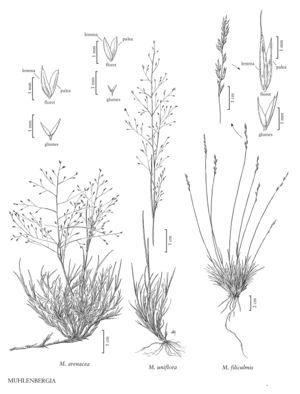Muhlenbergia filiculmis
Plants perennial; cespitose, not rhizomatous. Culms 5-30 (40) cm, erect, rounded near the base; internodes smooth or scabridulous. Sheaths longer than the lower internodes, glabrous, becoming flattened and papery or ribbonlike at maturity; ligules 2-4 (5) mm, membranous, acute; blades 2-6 cm long, 0.4-1.6 mm wide, tightly involute, filiform, stiff, scabrous abaxially, sparsely hirtellous adaxially, apices sharp. Panicles 1.5-7 cm long, 0.4-2 cm wide, contracted, sometimes dense; primary branches 0.1-2.8 cm, mostly tightly appressed or diverging up to 30° from the rachises; pedicels 0.1-2 mm, scabrous. Spikelets 2.2-3.5 mm. Glumes subequal, 0.8-2.5 mm, scabridulous distally; lower glumes 1-veined, awned, awns to 1.6 mm; upper glumes usually 3-veined, apices truncate to acute, 3-toothed, teeth sometimes shortly awned, awns to 0.6 mm; lemmas 2.2-3.5 mm, lanceolate, yellowish mottled with dark green, sparsely appressed-pubescent on the lower portion of the midveins and margins, hairs to 0.4 mm, apices scabridulous, acute to acuminate, awned, awns 1-5 mm, straight or flexuous; paleas 2.2-3.5 mm, lanceolate, acute to acuminate; anthers 1.5-2 mm, purplish. Caryopses 1.3-1.6 mm, fusiform, brownish. 2n = unknown.
Distribution
Colo., N.Mex., Utah, N.Dak., Ariz., Wyo.
Discussion
Muhlenbergia filiculmis grows on rocky slopes, dry meadows, and dry gravelly flats in forest openings and grasslands, at elevations of 2500-3500 m in the southern Rocky Mountains and northern Arizona. Kartesz and Meacham (1999) report it as occurring in North Dakota and Utah, but neither of the sources cited (McGregor et al. 1986; Welsh et al. 1993) supports its occurrence in these states.
It is sometimes difficult to distinguish Muhlenbergia filiculmis from M. montana, but that species has longer spikelets and lemma awns, and leaf blades that are flatter and not sharply tipped.
Selected References
None.
Lower Taxa
"decumbent" is not a number.
